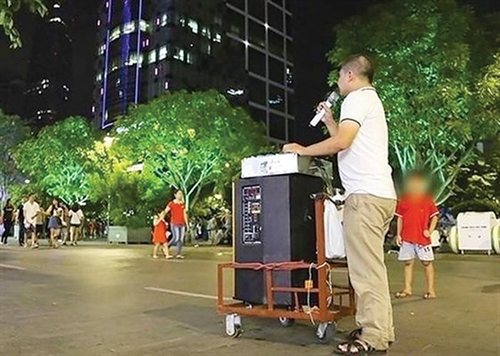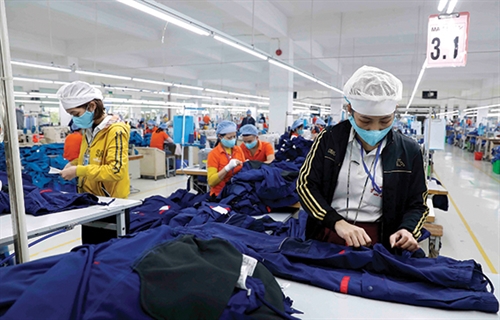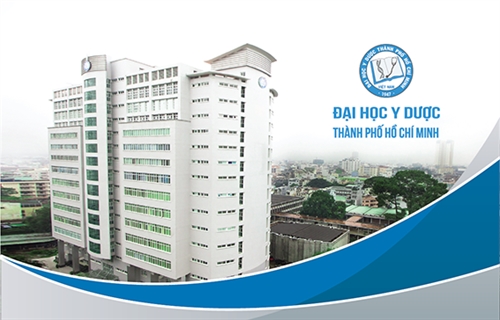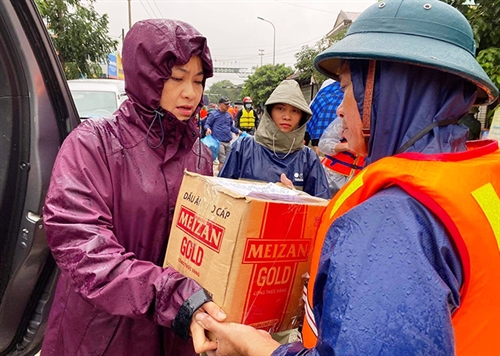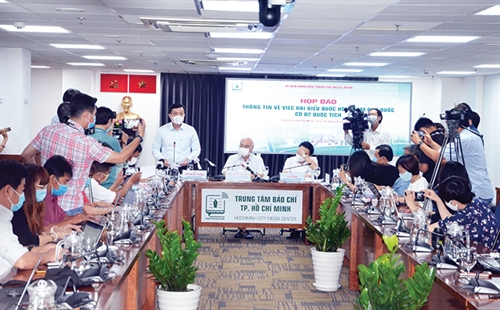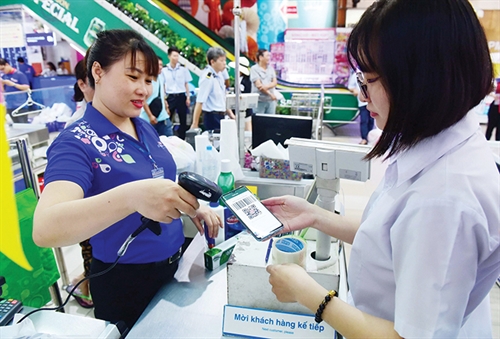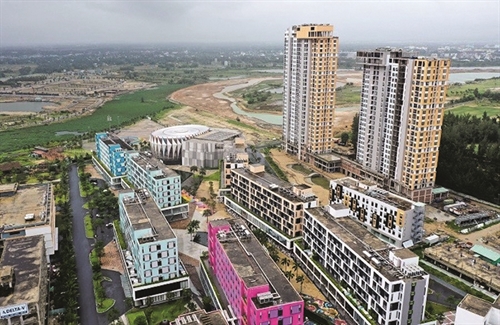Vietnam has so far been praised by the global community for its achievements in the combat against the COVID-19 pandemic. However, the country is now facing unprecedented new circumstances when its neighboring countries like Cambodia and Laos are struggling with a new coronavirus outbreak. Against that backdrop, the control and handling of illegal migrants undoubtedly play a vital role in the country’s fight against the deadly virus.
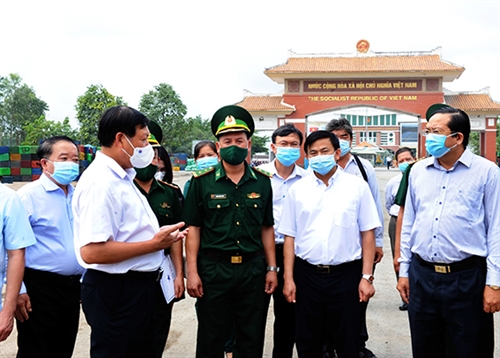 |
| A working team at Binh Hiep international border gate, Long An province Photo: Duc Hanh/VNA |
Vietnam has taken series of measures to prevent illegal entrants. The National Steering Committee for COVID-19 Prevention and Control, in Official Dispatch 3961/CV-BCD, required tighter border controls to crack down on illegal entry from neighboring countries. The Government, in an official telegraph, requested residents to report to local authorities on any suspected or illegal entry for testing and quarantine. According to the Border Guard High Command, nearly 1,600 border checkpoints have been established and maintained along the country’s borderlines. As of December 28, 2020, the border guards had dealt with 32,679 illegal immigrants, the Viet Nam News daily reported. On the first day of 2021 alone, 180 undocumented entrants were detected. Of these, 162 people entered the country via the Vietnam-China border and the rest via the Vietnam-Cambodia border. However, since the pandemic broke out in Cambodia, southern provinces bordering Cambodia have become hotspots in control of illegal entry.
Early this year, a group of immigrants from Cambodia were detected in Ho Chi Minh City and Vinh Long and Dong Thap provinces of whom four were tested positive with coronavirus.
On the morning of December 24, 2020, L.T.T., a 33-year-old man from Nhon Phu commune, Mang Thit district, Vinh Long province, who was later known as Patient 1440, crossed into Vietnam via the Cambodia-Vietnam land border at a river area identified near An Phu district, An Giang province, then boarded a car with five other illegal entrants - three of whom were later confirmed to be infected with coronavirus, Patients 1451, 1452, and 1453, - to return to their hometown.
T. said he had paid VND 50 million (about USD 2,100) to a group who claimed they could bring Vietnamese citizens into the country without having to undergo the mandatory quarantine as per COVID-19 prevention and control policies.
The police of Vinh Long province announced they have launched legal proceedings against the 33-year-old man for having illegally entered the country while carrying the virus. He was charged for the crime of “spreading dangerous contagious diseases to humans under Article 240 of the 2015 Penal Code,” according to Huynh Thanh Mong, deputy director of the Public Security Department of Vinh Long province.
Later An Giang province’s police detained three men who were alleged to have arranged the illegal entry of Patient 1440 and his companions.
According to preliminary investigation results, P.P.H., aged 42, set up links with people at home and abroad, including P.T.H., aged 26, and T.V.U., aged 32, all from An Giang province, to seek ways to illegally bring home Patient 1440 and eight others.
Speaking with Tuoi tre online, Minister of Public Security To Lam affirmed that all illegal migrants will be seized and strictly handled in accordance with law.
Penalties for illegal entry
For the time being, the act of illegal entry into the country will be either administratively handled under Government Decree 167/2013/ND-CP on administrative sanctions in the field of public security and social order and safety or criminally charged under the 2015 Penal Code (revised in 2017).
According to Article 17 of Decree 167, those who travel across the border without carrying out entry/exit procedures will be subject to a fine of VND 3-5 million (USD 130-210); foreigners who enter Vietnam without permission of Vietnamese authorities will face a fine of VND 15-25 million (USD 630-1,050) and, depending on the severity of their violations, might be deported from the country.
Regarding criminal charge on illegal migrants, Article 347 of the 2015 Penal Code stipulates: “A person who illegally exits or enters Vietnam or illegally stays in Vietnam although having been administratively sanctioned for this act, will be subject to a fine of VND 5-50 million (USD 210-2,100) or sentenced to imprisonment of between six months and three years.”
However, in case illegal entry/exit results in spreading of dangerous contagious diseases to humans, violators will also be handled according to Article 240 of the 2015 Penal Code under which the offenders might be sentenced to between 10 years and 12 years of imprisonment if their offense leads to declaration of epidemics by the Prime Minister or causes the death of two or more persons. As for those who commit the offense leading to declaration of epidemics by provincial-level People’s Committee chairpersons or the Minister of Health or causing human death, the penalty will be between five years and 10 years of imprisonment.
It is worthy to note that Vietnam has tightened its quarantine policies amidst complicated developments of the COVID-19 pandemic in the region and the world. Accordingly, from February 1 on, anyone entering Vietnam must undergo medical checks and 21-day quarantine, instead of 14 days as previously required. As COVID-19 is included in the list of group-A contagious diseases, illegal entrants will also be fined up to VND 15-20 million (USD 630-840) for shirking quarantine under Article 11.2 of Government Decree 117/2020/ND-CP on sanctioning of administrative violations in the field of health.
The role of those who arrange illegal entry cannot be omitted. If administratively handled under Decree 167 of 2013, violators will face a fine of VND 30-40 million (USD 1,260-1,680). Meanwhile, if criminally charged under Article 348 of the 2015 Penal Code which provides for the offense of organizing or brokering illegal exit from, entry into, or stay in Vietnam, they may be subject to an imprisonment sentence of up to 15 years, in the most severe cases like causing human death. Offenders may also be charged with a fine of VND 10-50 million (USD 420-2,100), banned from holding certain positions or practicing certain professions or prohibited from performing certain jobs for between one year and five years.
Measures taken by bordering localities
In fear of a possible fourth wave of COVID-19, in a recent meeting with leaders from 10 localities bordering Cambodia, Deputy Prime Minister Vu Duc Dam, who is also Chairman of the National Steering Committee for COVID-19 Prevention and Control, requested COVID-19 prevention measures to be ramped up to prevent the disease from penetrating into the country, stressing that persons who illegally enter Vietnam must be strictly handled in accordance with law.
Responding to the Deputy Prime Minister, Nguyen Thuong Le, head of the An Giang border guard force, said the province, which has a 100km-long borderline with Cambodia, is maintaining 200 border patrols with around 2,000 personnel to keep illegal entrants out. An Giang has also persuaded 33,000 families living near the border to sign commitments to guarantee no illegal entry and exit. Since the beginning of this year, the province has found over 600 people trying to illegally enter the country and have put them all into quarantine.
Pham Tan Hoa, Deputy Chairman of the People’s Committee of Long An province, said the province has built 13 new border posts with funds raised from various sources and land donated by local people. It is a significant addition to the province’s existing 36 border stations along its 130km-long border with Cambodia.
As for Tay Ninh province, the locality with a 240km-long borderline with Cambodia, Nguyen Thanh Ngoc, Chairman of the provincial People’s Committee said the province has deployed multiple measures to prevent illegal entry and exit, including handing out rewards for those who report illegal entry and exit cases and monitoring motorbike taxi services near the border. Tay Ninh currently has 123 border stations with over 600 personnel on duty.- (VLLF)
